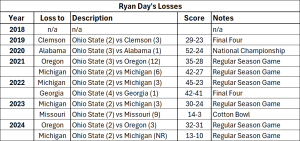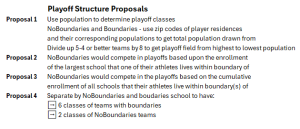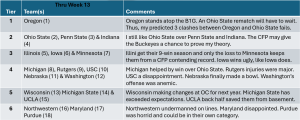Mike Cagley, Co-Host Sports Spectacular and Big Sports Radio
December 2, 2024
The craziest season in ages started its final weekend with a barnburner of a game on Friday night. It took Georgia 8 Overtimes to defeat a 7-5 Georgia Tech team from the ACC. All the while, ESPN jumped into “influencer mode” by proclaiming Georgia as being “guaranteed” a College Football Playoff (CFP) bid if they defeated Georgia Tech. Just like in other areas of broadcasting, there should be a conflict-of-interest notice when a network tries to manipulate opinions in favor of one of their own programming properties.
There were a few upsets this week. The biggest was the loss of #2 Ohio State, followed by #8 Miami, and #12 Clemson all losing to unranked/lower ranked teams. While #20 Texas A&M lost to the #3 Texas Longhorns.
The conference titles games look like they’ll be a ton of fun. As interesting as these matchups are, I think my curiosity is piqued most by seeing how the losers of the conference title games are handled by the committee. Is it better to play an extra game and lose or is it better to stay home, not play and hope for a lift when others are defeated? Stay tuned.
Ryan Day’s record as the head coach of the Ohio State Buckeyes stands at 66-10. Ohio State is the only head coaching job he’s had. Day losses have all been to teams ranked #12 and better until the loss to unranked Michigan. The challenge is that this is the 4th loss in a row to the Wolverines and this is also the 4th loss to the Wolverines when the Buckeyes were the #2 ranked team in the country.

There are very few coaches who would be questioned after losing 10 games over the course of 6+ years as a head coach. But Ryan Day is a special case because he’s:
Clearly, Day has done a very good job at Ohio State University. The biggest boosters cannot be happy with a coach who seems to be emulating John Cooper, the head coach who was 2-10-1 versus Michigan. Buckeye fans wonder what could have been if their school had moved away from Cooper sooner rather than later. Could OSU Athletic Director Ross Bjork decide to make a move and get a coach of his own choosing?
The post-game press conference of Ryan Day was obviously a highly emotion moment. It took place just minutes after a tremendous loss and an on-the-field clash with the Michigan team (which is a different subject and clearly a habit that has formed for Michigan teams which are enabled by an athletic department which doesn’t seem to care about this behavior – but that is a subject for another podcast).
When I watched that Ryan Day press conference, he looks like a beaten man. Will he be able to circle the wagons and get the Ohio State Buckeyes to place in the CFP like the $20 million dollar team they were expected to be? I don’t know. If he can’t, can Ross Bjork afford to stand pat and hope things get better next season? I wouldn’t be surprised if a change happened. And that Ryan Day would be a very in demand coach if there was a change made at Ohio State.
My final “what if” is what if Ross decided to call Urban Meyer to take over the team with three weeks of practice to straighten things out? Would the uber-talented Buckeyes be the odds-on favorite to win another national championship? My guess is we’ll never know…
Hail Mary #2 – Illinois High School Association Playoff Structure
On Friday, four state championship football games from class 1A to 4A featured teams without geographic enrollment boundaries (less call them NoBoundaries) competing against schools with geographic enrollment boundaries. The result - in every case - was that the geographically limited schools were blown out. I didn’t need to keep track of Saturday’s games to motivate me to write about this issue.
Two of the geographically limited schools - Lena-Winslow and Monticello - have head coaches with records that include a combined nearly 500 wins and each coach has multiple state championships. So, this wasn’t a case of ineffective coaching being exploited. This was a case of a team with geographic boundaries having roster gaps that NoBoundaries schools were able to close.
Put simply, NoBoundaries have a larger population to draw upon to acquire players. Whether a player pays a fee to play for these teams is irrelevant. By being “borderless” these teams inherently have more opportunities to attract, recruit, and acquire players to construct a better and deeper roster. And they don’t have to go through any process (real or not) of having players move to a location within their school district (because they have no borders).
For perspective, consider how much of a chance the Fighting Illini would have to beat Notre Dame if the Fighting Irish could recruit from the entire United States, while the Illini could only draw from players hailing from the state of Illinois. As bad as the Illini have fared in the past against Notre Dame, does anyone like their chances in the scenario I typed? It would be even worse. And that is saying something. For the record, Illinois is 0-11-1 against Notre Dame and has only scored in double digits one time.
I recommend looking at four alternatives to solve this issue equitably. And maybe one of these alternatives will trigger an even better idea from the minds of those smarter than me.
All four of these ideas could be augmented by having a Varsity Player Transfer Review Board that could look at the circumstances around any player transferring from one school to another to play varsity sports. Texas does this. The downside of this, of course, is that it does put a lot of power into the state sports association.
Proposal #1 - Use data analysis to determine the population base of school districts by zip code. Instead of enrollment, school sizes could be ranked by population base instead. The school districts could be ranked from top to bottom and divided into 8 classes, just as they are today.
A NoBoundaries school would simply add the population of the zip codes the players live in to get a total. For example, a team with players from 7 zip codes would add the population associated with those 7 zip codes to determine their population base. This would provide differentiation from teams with geographic boundaries that are limited to fewer zip codes (with many teams limited to just one).
If a NoBoundaries school didn’t want to bring in a player due to their population base growing too much, that would be a choice they would make in their roster building process.
Proposal #2 – This is an enrollment-based approach whereby the school enrollment for schools with geographic boundaries would still be used for their enrollment, just as they do today. For NoBoundaries schools, their enrollment would be determined by the school with the highest enrollment that one of their players resides in.
For example, if a NoBoundaries school pulled a player from a high school that has an enrollment of 2000 students - and that is the largest school a player is pulled from – an enrollment of 2000 students would determine where the NoBoundaries school competes in the post season. A similar system is used in Texas.
Proposal #3 – This is also an enrollment-based approach. Like #2, the school enrollment for schools with geographic boundaries would still be used for their enrollment, just as they do today. NoBoundaries schools would determine their enrollment by adding up the enrollments of schools their players reside in.
For example, if a NoBoundaries school pulled players from the geographic boundaries of five schools that have a total enrollment of 3000 students, that enrollment of 3000 would determine where the school competes in the post season.
Proposal #4 – Maintain 8 classes of football championships but have 6 classes for schools with geographic boundaries and 2 classes for NoBoundaries schools.
These ideas outlined above are a start in trying to find a solution instead of just complaining about a problem that most can clearly see. There are ways to address the inequities that result in what happened on Friday.
Is there the will to make changes? We will see. These issues can get sticky, especially if a private school association arises to challenge the Illinois High School Association.

The regular season is done and the B1G has 12 of its 18 teams eligible for bowling or the CFP. That’s a heck of a year. For comparison, the SEC will have 13 of its 16 teams eligible for postseason.
The fact Wisconsin and Maryland aren’t bowling is a bit of a surprise and both schools must be concerned in this era of NIL warfare. Let’s look at my final rankings

The CFP is next. It should be fun.

567 Illini Fall to Bruins 95-94 in OT
Listen
566 Illini Slay Trojans
Listen
565 Illini Defeat Hoosiers 71-51 in Boswell’s Return
Listen
2.13.26 - Illini Hoops Update, Hauck new DC & Pete Babcock
Listen
564 Illini Lead Evaporates in 92-90 OT Loss to Wisconsin
Listen
563 Inside Scoop on New Illini DC Bobby Hauck
Listen
562 Illini Fall 85-82 to MSU in OT
Listen
2.6.26 - Illini Hoops Update, Ayo Traded & Football Coaching Openings
Listen
561 Illini Smash Northwestern Push Win Streak to 12
Listen
560 Illini Defensive Coordinator Search
Listen
559 - #9 Illini Cruise Over #5 Nebraska 78-69
Listen
1.30.26 - Keaton Wagler's Historic Season & More
Listen
558 Illini Win Lifts the Streak to 10
Listen
557 Sturdy & Stevens on the Keaton Wagler Game
Listen
556 Illini Defeat Purdue 88-82 in the Keaton Wagler Game
Listen